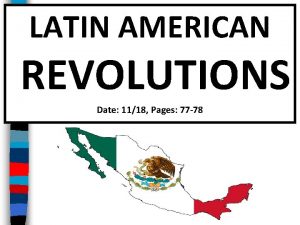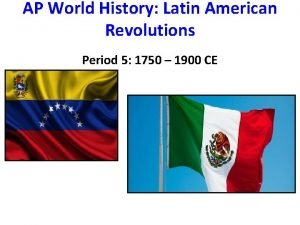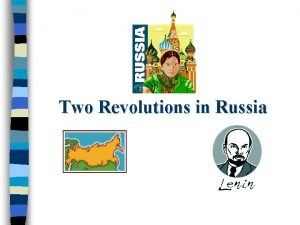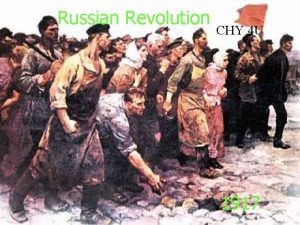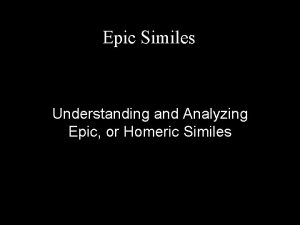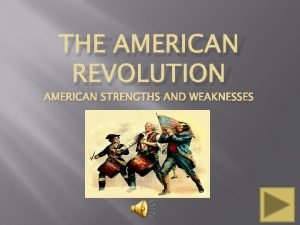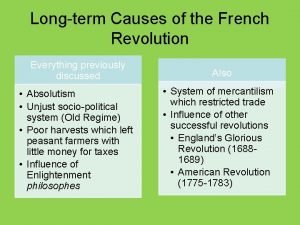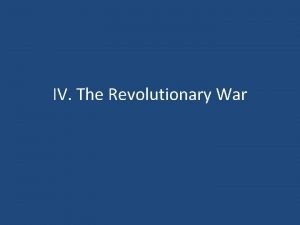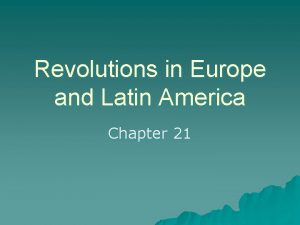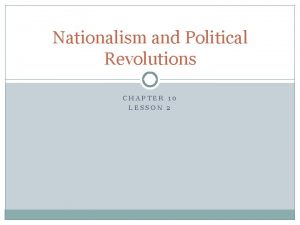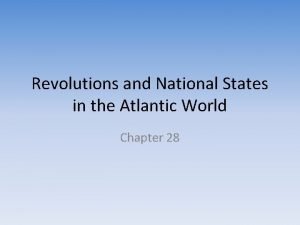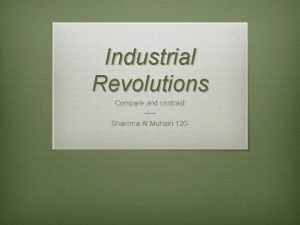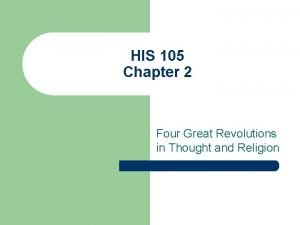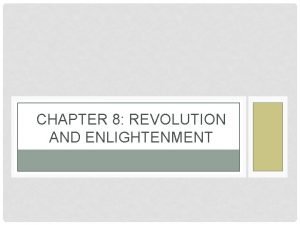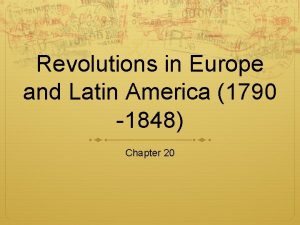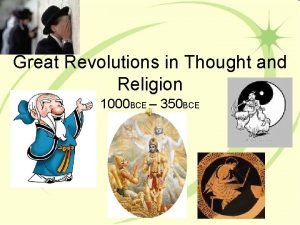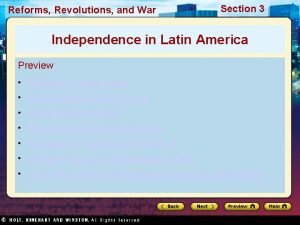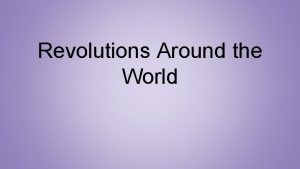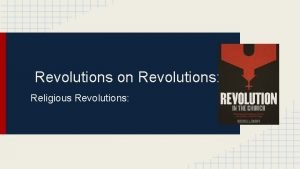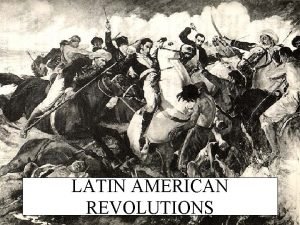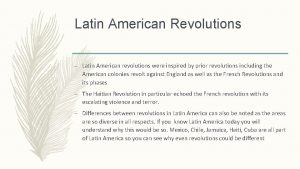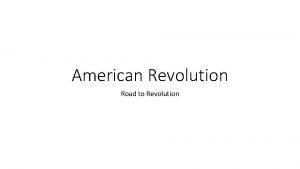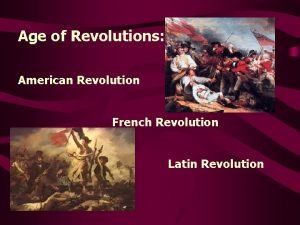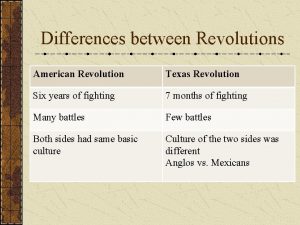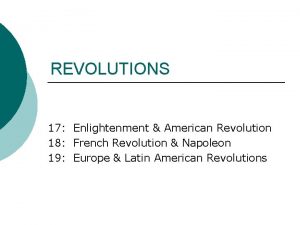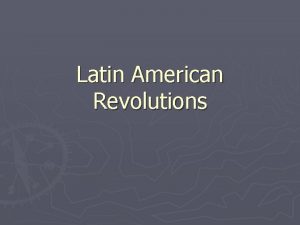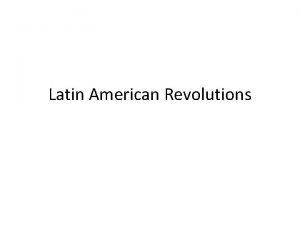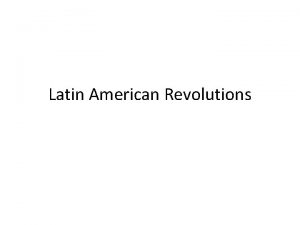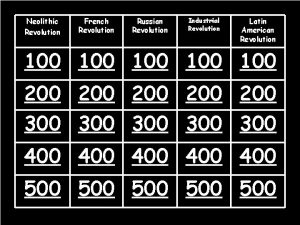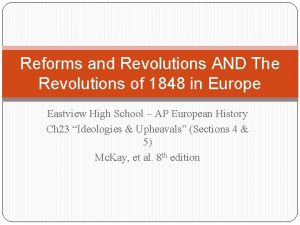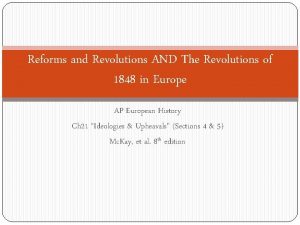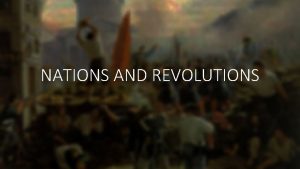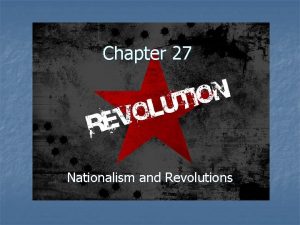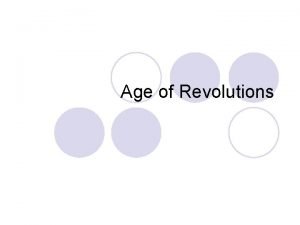TWO REVOLUTIONS COMPARED THE AMERICAN REVOLUTION AND THE




















- Slides: 20

TWO REVOLUTIONS COMPARED THE AMERICAN REVOLUTION AND THE VIETNAMESE WARS OF INDEPENDENCE

THE IDEA Barbara Tuchman’s March of Folly Author talks about times in history when leaders went “nuts” Leadership of Great Britain and 1960’s US followed self-destructive paths Reasons for Comparison American Revolution is part of AP World and standard on exit exams Exercise brings the US back into World History were it belongs Vietnam is a major revolution and participant in 20 th century history South East Asia is part of the expanded emphasis of the new AP Guide Compare and contrast is a major aspect of AP World History This study also has a quality of Change and Continuity over Time

GEOGRAPHY The United States Main axis of movement - north to south Coastal plains with inland highlands and mountains Main source of revolution - northern states (New England) Main population - the northern and mid-Atlantic states Main bastion of conservatism - southern states Main battle grounds - mid-Atlantic states (New York to Virginia) Key cities in the north: New York, Boston Vietnam • Main axis of movement - north to south • Coastal plains with inland highlands and mountains • Main source of revolution - northern provinces (Tonkin) • Main population - Annam and Tonkin (north) • Main bastion of conservative - southern provinces (Cochin. China) • Main battle grounds - central highlands of Annam • Key cities in the north: Hanoi, Haiphong

DISTANCES, SHORT DISTANCES Great Britain An island nation across the Atlantic All weapons and troops had to be transported across the ocean UK was 3, 440 miles distant from the American colonies United States Separated by the Pacific Ocean from Vietnam All weapons and troops had to be transported across the ocean Los Angeles to Saigon is more than 7, 000 miles American Colonists, Viet Cong, Vietnamese fought for their homes Americans and Viet Cong were both fighting on familiar terrain Both had relatives and homes in area to defend

PROTAGONISTS Great Britain The world’s largest power at time Maintained the world’s largest fleet The richest country of the day Her companies dominated trade Had colonial possessions and interests the world over At home country was extremely progressive and relatively democratic The United States The world’s superpower at the time Maintained the world’s largest fleet, 3 rd largest army The richest country of the day American corporations were the most powerful in world Had bases and interests the world over At home country was extremely progressive and relatively democratic

IDEOLOGIES American Revolution No taxation without representation Opposed to tyranny Believed in self-determination Words and rhetoric reflected the ideas of the Enlightenment Leaders quoted John Locke and the British Bill of Rights Vietnamese Revolution Communism: opposed to the tyranny of capitalists Sought to overthrow capitalist system Words and rhetoric reflect communism Leaders quoted Jefferson and the American Declaration of Independence Great Britain Mercantilism, colonialism Multi-party elections, rule by oligarchy The United States Anti-communism, great power ideology Business oriented, multi-party oligarchy

PRIOR TO THE WAR Both inherited problems from France Great Britain Had won colonial struggles of the French, Indian Wars In war had relied on colonial militias to help fight war Had won the territory of much of central North America The United States Had defeated Japan, acquired great influence in region During World War II, US had armed, helped anti-Japanese forces Viet Minh forces had defeated French at Dien Bien Phu 1954 Indo-China, 1765 North America Truce separated Tonkin, Cochin China; partitioned Elections were to follow to reunited country English ruled diverse populations with different needs, wants No uniform approach to policies, approaches often angered locals

LEADERS Political American: John Adams, Thomas Jefferson Gifted organizers and orators, known abroad Vietnamese: Ho Chi Minh Helped establish French Communist Party Lead Viet Minh against Japanese, French Military American: George Washington Leader of the French-Indian Wars, well respected Vietnamese: Vo Nguyen Giap Had led Vietnamese forces against Japanese, French Diplomatic American: Benjamin Franklin Spoke fluent French, worked well with French elite Vietnamese: Le Duc Thieu Educated in France, spoke flawless French

MANY ENEMIES ABROAD Great Britain France and Spain Both eventually sent troops to assist the Americans French army significant at Battle of Yorktown Netherlands Recognized the United States Provided aid to the colonists League of Armed Neutrality Prussia, Russia, Denmark and Sweden remained neutral But they also sympathized to a degree with the colonists The United States The Communist World especially the USSR and China Both openly furnished weapons, money, support for the Vietnamese Both had observers and advisors with Vietnamese army, guerrillas Strong opposition to the United States by many nations Arab world, African world, Latin America openly criticized the US Actively supported the Vietnamese in the United Nations, media

SOME FRIENDS, BUT NOT MANY Great Britain’s king was also rule of Hanover in Holy Roman Empire German states such Hesse, Brunswick, Thuringia duchies “Canada” and other Atlantic colonies actually involved in the war All furnished mercenaries, military units to support the British war effort The United States Southeast Asia Treaty Organization (SEATO) South Korea, Philippines Australia, New Zealand All had active troops and divisions in the war

“IMPERIALIST” GOVERNMENTS Great Britain War run by Lord North and his ministers and cabinet North often did not listen, consult Parliament British denied colonists rights guaranteed to most Englishmen British denied established rights to English citizens in Great Britain Uncompromising on the conduct of the war and its outcome Lack of military and political aims in the war Persistent and repeated miscalculations on part of government about war The United States Johnson and Nixon administrations ran war Both manipulated Congress, lied about war Both fought for democracy but supported dictatorial practices during war Both denied American citizens rights during protests, war Uncompromising on the conduct of the war and its outcome Failure to articulate realistic military and political goals in the war Persistent and repeated miscalculations on part of government about war

REVOLUTIONARY GOVERNMENTS The American Colonies Continental Congress had limited influence over states Individual states ran by their own legislatures and state militias Limited participation by population: landowners could vote Large population had no rights: Indians, poor, women, slaves Loyalists: opponents harshly treated Vietnam Two different governments: North Vietnam and South Vietnam National governments were often secondary to military, generals, troops Communist party was an elitist organization in the north South Vietnam was run by wealthy landowners Large Franco-phone Catholic military clique Basic rights were denied during war to most people Opponents harshly treated

HEARTS TO WIN American Revolution The Southern States Southern plantation owners were not revolutionary Majority of population neutral Slavery was a key issue The American Indians Frontier was thinly populated except by Indians Favored the British and opposed the Americans Vietnam Cochin-China Southern population was not totally Vietnamese Long history independent of north Strong Hindu, Buddhist, Catholic presence in South North tended towards Chinese influence, Confucianism The Hill Peoples Highlands, mountains, jungles thinly populated Montagnards, Negritos opposed both Hanoi, Saigon

OPPOSITION TO WAR Great Britain Strong domestic opposition to the war Many in Parliament openly opposed the government Many parts of the country (Scotland, Ireland) sympathized with the colonists Many famous Englishmen supported the colonists: Adam Smith Domestic opposition to war grew over time, from all societal elements The war split families United States Strong domestic opposition to the war from the youth Many Democrats were decidedly anti-war College campuses, California strongly anti-war, pro-Vietnamese Domestic opposition grew over time, from all societal elements Minorities were most impacted negatively by war Many actors and intellectuals opposed the war: Jane Fonda The war split families Vietnam Buddhists, many non-Vietnamese opposed war

COMBAT Great Britain Relied on professional troops including mercenaries Extremely well-trained, well-fed, well-supplied Had superiority in numbers, ease of movement Navies commanded the seas Technological superiority especially in cannons, howitzers And the American Colonists? Some professionals Largely militias using whatever weapons they had Knew terrain and used it against British Practiced restraint throughout war United States Relied on professional troops including allies Extremely well-supplied and well-trained Had superiority in numbers, ease of movement Navies commanded the sea Technological superiority in air power, helicopters, tanks, howitzers And Vietnam? Some professionals but mostly volunteers Many different types of weapons Used guerrilla warfare and terrain to fight the Americans Practiced restraint? Depends on whose POV

LONG PROLONGED STRUGGLE Great economic dislocation in both countries and colonies American Revolution War disrupted British commerce – colonial navy seized merchants War disrupted colonial economies – planting, commerce disrupted 1 in 3 colonies eventually immigrated Vietnam War Over 1 million Vietnamese killed, millions more dislocated Hundreds of thousands of people immigrated Much of productive wealth damaged during war throughout country In US, vast inflation and stagnant growth, debt swelled Both nations missed opportunities to disengage from conflict Both nations lacked experience in dealing with their rebels British disregard colonials as backwater hicks Americans misjudged Hanoi’s resolve, capabilities

THE CIVIL WAR WITHIN THE WAR American Revolution Not all Americans supported independence Loyalists strongest in the South but in all provinces Many openly supported British even with troop levies After war, loyalists immigrated, expelled to Canada Vietnamese Wars of Independence Not all Vietnamese supported Communist Hanoi, Viet Cong Loyalists strongest in the South but in all provinces Republic of Vietnam furnished largest troop contingent After war, South Vietnamese immigrated, sent to re-education

PRE-WAR, WARTIME DIPLOMACY Great Britain: 1774 – 1783 Unwillingness to listen to European powers Unwillingness to negotiate with colonists Lack of ability to negotiate a satisfactory end to war United States 1960 – 1975 Unwillingness to negotiate or abide by 1954 Geneva decision Unwillingness for a decade or more to negotiate with Hanoi The British and the United States had win to negotiate a satisfactory end to war Lack of to ability Neither side could suffer defeat or admit to defeat Both sides often won major battles but lost some too American Colonists, Viet Cong did not have to win They had to simply outlast the British, US military They both sought victory through convincing others Both sides continued fighting while they negotiated British negotiated with colonists in France, Belgium The US and North Vietnam negotiated at Paris

DOMINO EFFECT Great Britain and Fears Realized? Fear American independence would spread “fever” Most worried about Scotland, Ireland, Canada, slaves French Revolution, Revolution in Haiti, Latin American revolutions United States and Fears Realized? Worried that they had to stop spread of communism A victory in Vietnam would spread communism to SE Asia Communism established in Cambodia, Laos, Nicaragua, parts of Africa

DIFFERENCES British and colonists used conventional military tactics, Viet Cong were guerrillas Violence and intimidation by either side was limited in American Revolution Violence and intimidation by both sides was quite common in Vietnam American colonists were not Viet Cong had to struggle long and hard to win support South openly did not want to be Communist They did not fight guerrilla war – in fact rarely did they use these tactics Despite protests, the colonists were not treated like Irish Americans were not imprisoned, executed like Irish Americans were not ruled at point of bayonet British were horrified at Boston Massacre and war crimes Americans in Vietnam could not tell differences between sides Americans often mistreated even South Vietnamese US backed military solutions with regard to whole populace US allowed Republic of Vietnam armed forces to use terror Until Mei Lai Massacre, atrocities were generally ignored and not reported Family? British and Americans knew each other well Americans, Vietnamese did not know or really understand each other
 Did american revolution cause french revolution
Did american revolution cause french revolution Latin american revolution date
Latin american revolution date Latin american revolution definition ap world history
Latin american revolution definition ap world history American school system compared to danish
American school system compared to danish A tale of two revolutions grade 10, 1080l
A tale of two revolutions grade 10, 1080l A tale of two revolutions grade 10, 1080l
A tale of two revolutions grade 10, 1080l Epic smile definition
Epic smile definition Strengths of the continental army
Strengths of the continental army Long term causes french revolution
Long term causes french revolution American revolution strengths and weaknesses
American revolution strengths and weaknesses Russian revolution vs french revolution
Russian revolution vs french revolution The third agricultural revolution
The third agricultural revolution Revolutions in europe and latin america section 2 quiz
Revolutions in europe and latin america section 2 quiz French revolution political spectrum
French revolution political spectrum Revolutions and national states in the atlantic world
Revolutions and national states in the atlantic world First and second industrial revolution
First and second industrial revolution Four great revolutions in thought and religion
Four great revolutions in thought and religion How were european rulers guided by enlightenment thought?
How were european rulers guided by enlightenment thought? Revolutions in europe and latin america
Revolutions in europe and latin america Aryan food
Aryan food Reforms revolutions and war answer key
Reforms revolutions and war answer key

